On this day on 19th October
On this day in 439 the Vandals, led by King Gaiseric, took Carthage in North Africa. As Rome relied heavily on food from Africa, this was a serious blow to the survival of the Roman Empire. Salvian was a Christian living in Marseilles. He wrote: "The Romans were once the mightiest of men, now they are without strength; of old they were feared, but now they live in fear. Under the judgement of a just God we are paying what we owe." He then goes on to quote Jesus Christ: "What men have sowed, they shall also reap." In 476, Flavius Odoacer, the leader of the barbarian mercenaries in the Roman Empire, overthrew Emperor Romulus Augustulus, and installed himself as the King of Italy. However, the eastern empire, ruled from Constantinople, continued for another thousand years. It was not until 1453, when Mehmed II captured Constantinople, that the Byzantine Empire, as it became known, ceased to exist.
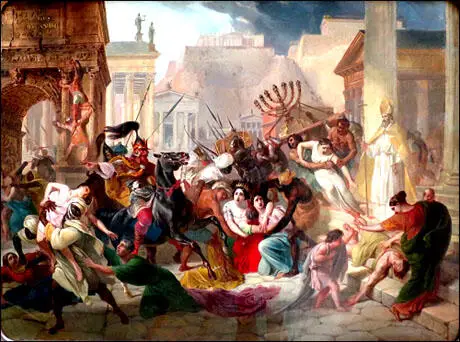
On this day in 1216 King John of England died of dysentery. His son Henry was only nine-years-old and the supporters of Louis quickly deserted to the young prince. He was crowned, and the government was carried on in his name by a group of barons led by William Marshal, Earl of Pembroke. They made sure that the principles of the Magna Carta came to be accepted as the basis of the law.
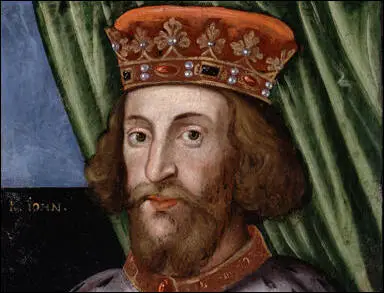
On this day in 1512 Martin Luther was awarded his Doctor of Theology at the University of Wittenberg. He was appointed to the post of professor in biblical studies. He also began to publish theological writings. Luther was considered to be a good teacher. One of his students commented that he was "a man of middle stature, with a voice that combined sharpness in the enunciation of syllables and words, and softness in tone. He spoke neither too quickly nor too slowly, but at an even pace, without hesitation and very clearly." Luther began to question traditional Catholic teaching. This included the theology of humility (whereby confession of one's own utter sinfulness is all that God asks) and the theology of justification by faith (in which human beings are seen as incapable of any turning towards God by their own efforts.
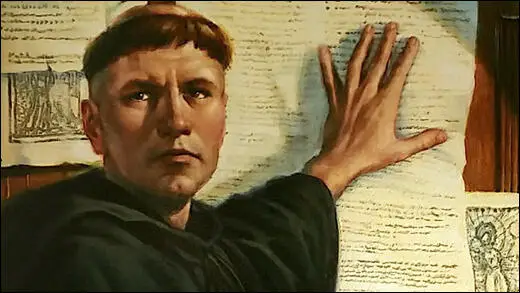
On this day in 1609, Gerrard Winstanley, founder of the Digger movement was born. Winstanley was a "vigorous supporter of parliament" but the English Civil War had a bad impact on his business. Several merchants were unable to pay money they owed Winstanley. In the autumn of 1643 he vacated his house and shop in London and moved to Cobham. He later wrote: "the burdens of and for the soldiery in the beginning of the war, I was beaten out of both estate and trade, and forced to accept the good-will of friends, crediting of me, to live a country life."
During the war life was hard for people living in Cobham. Most people living in the village were landless labourers and the area was dominated by a few entrepreneurial yeomen farmers and gentry. Winstanley was one of the more prosperous farmers but he had sympathy for the poor. On 10th April 1646 Winstanley, with five other men and two women, was fined at Cobham manorial court for digging on waste land and taking peat and turf. According to J. D. Alsop "this was probably a symbolic protest by manorial tenants, four of whom were local office holders".
Winstanley published four pamphlets in 1648. These were highly critical of religious leaders who "hold forth God and Christ to be at a distance from men" or think that "God is in the Heavens above the skies". Winstanley argued that God is "the spirit within you". Winstanley then went on to describe God "doth not preserve one creature and destroy another... but he hath a regard to the whole creation; and knits every creature together into oneness; making every creature to be an upholder of his fellow; and so every one is an assistant to preserve the whole."
In October 1648 Winstanley's friend William Everard was arrested. It was reported that he held blasphemous opinions "as to deny God, and Christ, and Scriptures, and prayer". His arrest prompted Winstanley to publish Truth Lifting up the Head above Scandals (1648), in which he asked who has the authority to restrain religious differences? He argued that Scripture, on which traditionally authority rested, was unsafe because there were no undisputed texts, translations, or interpretations. Winstanley concluded that authority should be based in the spirit. "All people carried the spirit, and thus their own authority, within them. The academics and clergy were following their own imaginations rather than the spirit and... must be seen as false prophets".
Gerrard Winstanley gradually became more radical and he began arguing that all land belonged to the community rather than to separate individuals. In January, 1649, he published the The New Law of Righteousness. In the pamphlet he wrote: "In the beginning of time God made the earth. Not one word was spoken at the beginning that one branch of mankind should rule over another, but selfish imaginations did set up one man to teach and rule over another."
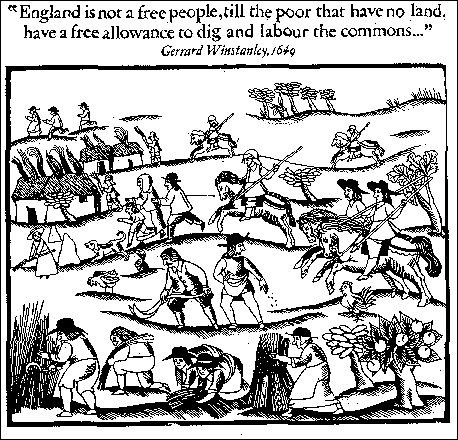
On this day in 1895, Lewis Mumford, American historian was born. Mumford worked as a lecturer at the New School for Social Research (1931-35) and was a member of the League for Independent Political Action. The group, that included Archibald MacLeish and John Dewey, promoted alternatives to a capitalist system they considered to be obsolete and cruel. Mumford was concerned with the adverse effect of technology on contemporary society and this is reflected in his books, Technics and Civilization (1934) and The Culture of Cities (1938). Other books by Mumford include The Condition of Man (1944), Green Memories, The Story of Geddes Mumford (1947), A Study of the Arts in America, 1865-1895 (1950) and The City in History (1961). In later years Mumford was awarded The Presidential Medal of Freedom (1964), the National Medal for Literature (1972) and in 1975 became an honorary knight commander of the Order of the British Empire. Lewis Mumford died in 1990.
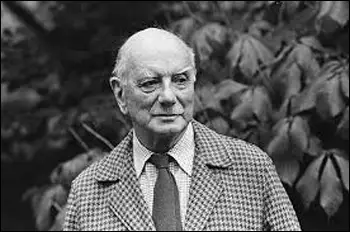
On this day in 1900 Max Planck discovered Planck's law of black-body radiation. Planck researched into the manner in which heated bodies radiate energy led him to argue that energy is emitted only in indivisible amounts, called "quanta", the magnitudes of which are proportional to the frequency of the radiation. Planck's theories were in conflict with classical physics and his work is said to have marked the commencement of modern science. Albert Einstein used Planck's quantum theory to explain photoelectricity and Niels Bohr successfully applied the quantum theory to the atom. In 1918 Planck was awarded the Nobel Prize for Physics.
In 1930 he was appointed as president of the Kaiser Wilhelm Institute in 1930. An opponent of Adolf Hitler, Planck resigned his position in 1937 in protest against the decision by Bernard Rust, the minister of education, to sack Jewish teachers from Germany's universities. Planck refused to work on any of Germany's war research projects. In 1944 Planck's youngest son, Erwin Planck was arrested and charged with involvement in the July Plot against Adolf Hitler. He was killed while being tortured by the Gestapo in 1945. Max Planck died on 4th October, 1947.
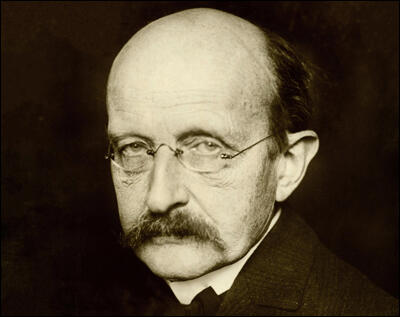
On this day in 1922 Conservative MPs vote to terminate the coalition government with David Lloyd George. This came after a passionate speech by Stanley Baldwin: "The Prime Minister was described this morning in The Times, in the words of a distinguished aristocrat, as a live wire. He was described to me and others in more stately language by the Lord Chancellor as a dynamic force. I accept those words. He is a dynamic force and it is from that very fact that our troubles, in our opinion, arise. A dynamic force is a terrible thing. It may crush you but it is not necessarily right."
Lloyd George was forced to resign and his party only won 127 seats in the 1922 General Election. The Conservative Party won 344 seats and formed the next government. The Labour Party promised to nationalise the mines and railways, a massive house building programme and to revise the peace treaties, went from 57 to 142 seats, whereas the Liberal Party increased their vote and went from 36 to 62 seats.
Lloyd George was never to hold office again. A. J. P. Taylor wrote: "He (David Lloyd George was the most inspired and creative British statesman of the twentieth century. But he had fatal flaws. He was devious and unscrupulous in his methods. He aroused every feeling except trust. In all his greatest acts, there was an element of self-seeking. Above all, he lacked stability. He tied himself to no man, to no party, to no single cause. Baldwin was right to fear that Lloyd George would destroy the Conservative Party, as he had destroyed the Liberal Party."
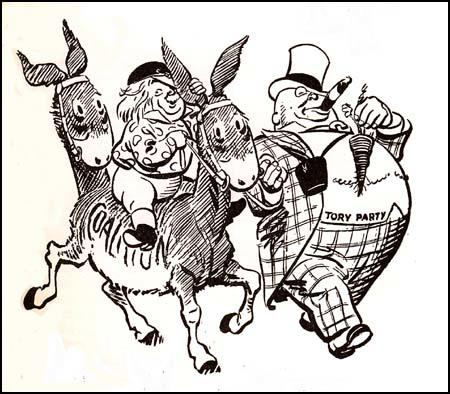
On this day in 1922 Jack Anderson, American journalist was born. In 1945 Anderson joined the United States Army in Chunking. He first served in the Quartermaster Corps and then wrote for the Stars and Stripes. He also did some reporting for the Armed Forces Radio. According to Anderson's autobiography, Confessions of a Muckraker (1979), Spencer Moosa of the Associated Press suggested to Anderson that he should try and get a job with Drew Pearson in Washington.
Anderson took Moosa's advice and in 1947 he became a member of Pearson's staff. Anderson was a "legman" for Pearson's column, Merry-Go-Round, that appeared in the Washington Post and in newspapers all over the United States. One of Anderson's first stories concerned the dispute between Howard Hughes, the owner of Trans World Airlines, and Owen Brewster, chairman of the Senate War Investigating Committee. Hughes claimed that Brewster was being paid by Pan American Airways (Pan Am) to persuade the United States government to set up an official worldwide monopoly under its control.
Anderson helped Pearson investigate stories of corruption inside the administration of President Dwight Eisenhower. They discovered that Eisenhower had received gifts worth more than $500,000 from "big-business well-wishers." Anderson was a close friend of Lyndon B. Johnson. In 1956 Pearson began investigating the relationship between Johnson and two businessmen, George R. Brown and Herman Brown from Texas. Pearson believed that Johnson had arranged for the Texas-based Brown and Root Construction Company to avoid large tax bills. Johnson brought an end to this investigation by offering Pearson a deal. If Pearson dropped his Brown-Root crusade, Johnson would support the presidential ambitions of Estes Kefauver. Pearson accepted and wrote in his diary (16th April, 1956): "This is the first time I've ever made a deal like this, and I feel a little unhappy about it. With the Presidency of the United States at stake, maybe it's justified, maybe not - I don't know."
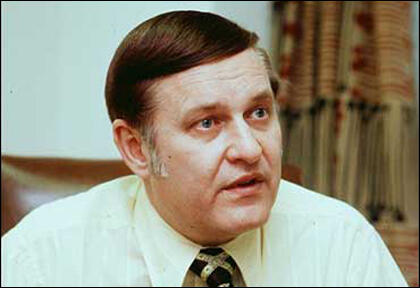
On this day in 1945, N. C. Wyeth, American painter and illustrator died. As an art student he was taught by Howard Pyle. Wyeth's work shows Pyle's influence in both style and content. During his lifetime Wyeth produced more than 3,000 illustrations, murals and paintings. He illustrated a large number of books including Last of the Mochicans (1919), Robin Hood (1921), David Balfour (1924) and The Deerslayer (1925). Newell Convers Wyeth died in 1945.
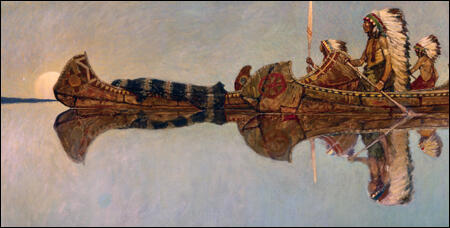
On this day in 1950 Edna St. Vincent Millay, poet and playwright died. Millay was to write several poems about the the Sacco-Vanzetti Case. The most famous of these was Justice Denied in Massachusetts. In 1931 Millay published, Fatal Interview (1931) a volume of 52 sonnets in celebration of a recent love affair. Edmund Wilson claimed the book contained some of the greatest poems of the 20th century. Others were more critical preferring the more political material that had appeared in The Buck and the Snow.


